Text
The Face of K-pop: How BTS Has Changed K-pop’s Perception in Western Media

Debuting in 2013, BTS has since become one of the most popular performing groups in the world. The seven member K-pop idol group has taken western media by storm after winning the Top Social Artist award by a landslide at the 2017 Billboard Music Awards, having everyone wonder what exactly set this group apart from all the rest. As the western market has began to open their hearts to music sung mainly in Korean, K-pop has gained a newfound appreciation and respect as a music genre.
But what did western media think of K-pop before?
In 2009, famous K-pop idol group Wonder Girls made it onto the Billboard Hot100 chart for the English remake of their popular song ‘Nobody’, which peaked at the number 76 spot. Although the success of this song allowed for more Asian representation in popular media, it also gave off the notion that Asian artists could only do well internationally if they released their music in English, a notion that, to some extent, still exists today. Three years after the release of ‘Nobody’, popular K-pop artist PSY released his hit song ‘Gangnam Style’. The song did unexpectedly well on the international market, even charting on the Billboard Hot100 charts for a consecutive 31 weeks, peaking at the number two spot. People of all ages were tuning into the song and learning the signature choreography. PSY and ‘Gangnam Style’ soon became the face of K-pop, and although this meant more Asian representation in the media, it also meant that people began to see all of K-pop as a solely comedic genre, not one that could also be serious and meaningful. PSY has released many deep and significant tracks, but he is more widely known for his humorous music style, videos, and dances, as seen in his songs ‘New Face’ and ‘I Love It’.

Recently, BTS has made huge strides in the western market, having their recently released album, “Love Yourself 承 'Her'”, peak at number seven on the Billboard 200, the highest ranking of any Asian artist in history. The title track of the album, ‘DNA’, also charted on the Billboard Hot100, entering at number 85 and peaking at number 67, beating out Wonder Girls to become the highest ranking K-pop group in this category. Although BTS has released many songs meant to be humorous and witty, they became popular internationally for their more serious songs, all released mainly in Korean. This has allowed people unfamiliar with K-pop to look at the genre with a more serious approach, and has also aided in the normalization of Asian countries and people, as many people gain prejudiced views of other nations through their media output. BTS has shown through their musical success that artists and people can still be taken seriously while not speaking English, and have empowered many listeners to take their same approach to becoming comfortable with nonconformity.
Take a listen:
youtube
youtube
youtube
youtube
1 note
·
View note
Text
Artist in Spotlight: RM
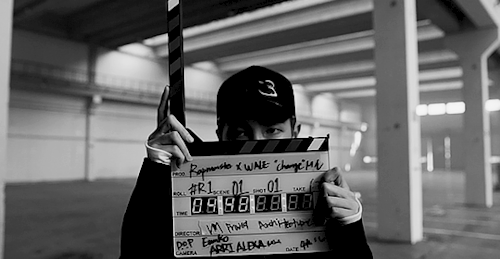
RM, born Kim Namjoon and formerly known as Rap Monster, is a 23 year-old South Korean rapper, songwriter, and producer under BigHit Entertainment. He’s most popularly known for being part of the K-pop idol group BTS, acting as the leader and main rapper of the group. RM is one of BTS’ main songwriters and producers, having played a role in producing music for each one of BTS’ albums to date, even having over 60 songs certified to his name by the Korea Music Copyright Association. His career has been nothing short of successful, selling out arenas and domes worldwide with an ever-growing fan-base.
But where did he begin?
Under the stage name “Runch Randa”, RM started in the music industry as an underground rapper. He released a number of tracks during his time in the underground and even collaborated with other then-underground rappers, such as rapper Zico. However, in 2010 RM was recruited as the first member of BTS and began training under BigHit Entertainment, alongside two other underground rappers, Min Yoongi and Jung Hoseok, who would later become his fellow BTS members, Suga and J-Hope. He debuted as a member of BTS in 2013, on the popular Korean music show M!Countdown, with the song “No More Dream” from the album “2 Cool 4 Skool”.
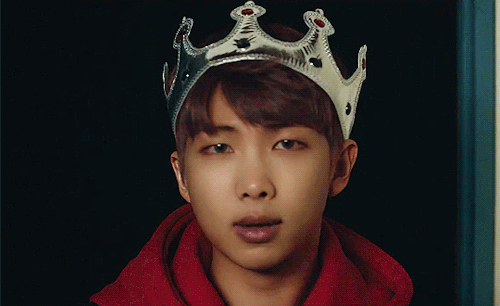
Around the same time that BTS began debut promotions, RM was also making music with another group, the Daenamhyup Crew. RM had been a part of this underground group even before his audition with BigHit Entertainment, since 2009, and the group of nine members released many tracks together, such as “You Can’t Do That” and “We Are B.P.B”. Two of the nine members of the Daenamhyup Crew, Iron and Supreme Boi, were originally set to debut alongside the rest of BTS, however Iron instead moved to Polaris Entertainment and Supreme Boi became one of the main producers of BTS’ music. With BTS’ debut, RM turned to focus more on his work with the group, and thus did not take part in the release of Daenamhyup Crew’s first mixtape release in 2014.
Still promoting with BTS, in 2015 RM released a self-titled solo mixtape, “RM”, through a personal Sound Cloud account. The mixtape consisted of 11 track with topics ranging from general diss to self-empowerment. Track six, titled “농담 (Joke)” was written as a general diss to rappers who rap nonsensically or those who only write lyrics degrading women and boasting about their conquests:
“Rap idiots,
your standard is a commotion
fame, girls, money…”
On the other hand, RM also raps in his mixtape about hopefulness for the future, with uplifting words for listeners and fans in track eleven, “I believe”:
“I haven’t ever questioned my voice, so real,
in my world, I am a god, that’s not a deal.
how you feel babe, do you believe that you’re your own master?
are you matching well on the see-saw between reason and sense?
you want to become everything, a leader for yourself
but you have to believe in yourself, your own leader.
I have the Milky Way inside me but
no matter where I am or what I do,
I believe.”
RM used his mixtape as a way to reveal and talk about his true feelings, explaining his anxieties and worries, and how he began to overcome them through the production of his music. His music leans more towards deeper, more intellectual meanings and descriptions for life’s everyday happenings, and these meanings were used as a means of connecting to his listeners and fans, and even to himself.

Since the release of his mixtape, RM has continued to explore his talents and collaborate with other artists, even famously collaborating with Marvel Entertainment on the digital single “Fantastic”, released with the 2015 Fantastic Four movie. With the BTS passing their fourth year together, the group has released 8 more mini and full albums, with some repackaged albums, many of which RM has heavily participated in writing and producing, as well as rapping. As the group moves forward, fans may expect more music produced by RM, or possibly even a second mixtape.
Take a listen:
youtube
youtube
youtube
youtube
Read on:
(X)(X)
1 note
·
View note
Text
Musician Interview: Dr. Douglas Lundeen

This week, I decided to interview a man by the name of Douglas Lundeen, an associate professor of music at Rutgers University and a professional horn player, having played in cities across the U.S. and England.
Read on to hear about his experience with music:
When did you start playing music?
Like so many people in this country, 4th grade—you choose an instrument—and I picked the clarinet, and I started playing the clarinet.
How did you become interested in music?
I remember we had the phonograph, the record player that we had, played 78 rpm records. And we had the Nutcracker Suite, and I remember being, like, about five and putting that on over and over again and dancing around to it. So I would say that, as far as I can remember, I really responded to music a lot. And there was a really wonderful music program at the church that we went to—I went to Episcopal church, and the Episcopal church is known for preserving a classical tradition of music. And I remember always being inspired by that. But it was when I was about 13 and went Christmas caroling with the youth group—we went to old folks’ homes and hospitals and around the neighborhood—and sang for people and saw how happy it made them, and how happy it made me to sing for them, that made me start to go “oh, this music-thing is pretty powerful and pretty neat”.
What kind of instruments do you play?
I mean, professionally, I just play the french horn. And I sing. I mean, originally, the thing I wanted to be able to do first was to be an opera singer, and I studied with teachers from Metropolitan Opera. But I picked up the french horn on the side—I switched in high school because they had plenty of clarinets and they ran out of horn players. And I loved already a lot of the music—knew already the music—that featured the french horn, and was really inspired to be like “oh wow, I could play this too”. So I taught myself to play the french horn without intending to become a professional horn player but, just the way things worked out, I got the opportunities on the french horn so I ended up a french horn player. But recreationally, I play the Native American flute and, as a meditative practice, I play the Japanese Buddhist shakuhachi—the five-hole, ancient flute.
What does music mean to you?
Music is the thing that proves that words aren’t sufficient. Because music gives you feelings and emotions without words. And yeah, most of the popular music has words. But there’s a lot of music, especially in the classical tradition, that has no words and is very powerful. And I would even say there are pieces of music that, for me, connect directly to the spiritual world. I should back up—when I was 13 I had my first serious thought about, y’know, “what am I gonna do in my adult life? What am I gonna be?” And my first inclination, actually, was that I might want to be an Episcopal priest. And then when I was doing that Christmas caroling, frequent thoughts would come to my mind that I could tell weren’t from my own mind? They were from the Big Mind. And when I was thinking about becoming a priest, the thought from the Big Mind came and said “you will be a minister, but your ministry is music”. So music has always been, to me, about something spiritual. And the great gift of music is the ability to perceive that the spiritual is a real thing. ‘Cause I studied western philosophy and western philosophy tries desperately, through definition of words and logic, to prove that God is real. And words can’t prove that God is real. But there are times that I’m playing and listening to music where the music proves to me that the spiritual world exists.

What are your favourite music genres?
Y’know, I grew up in a time when the Beatles were active, and Jimi Hendrix, and Janis Joplin, and there was a great outpouring and evidence of spirit in the music in the popular field. But about that same time I discovered the classical music, and I just threw myself 100% at the classical music. And now, I mostly don’t listen to music at all—man-made music. I go out into the wilderness to hear the natural music. To hear the birds, and the wind, and the trees, the rushing of the stream, and that’s music. I listen to the natural music because that music is what I then use as the source for my musical expression when I play my instrument.
What do you feel about the current music trends?
I think that music has become an industry, much like anything else, and it’s controlled by the money interests. What I observed is, when the Beatles started making humongous amounts of money, the people who wanted to profit off that came into the music world and created an industry. And they carved it up into all different genres and mini-genres as a product to sell. There was Madonna, who was the envelope-pushing, risque, blonde, sexual artist, and then when she got a little too old to be marketable, they brought along Lady Gaga. And you can go through the whole music industry and say “ok, this is the boy-band, this is the girl-band, this and that”, it’s all been carved up. You’ve got very smart people doing the marketing research, seeing who likes what kind of music, and they find the people to fit the niche. And the biggest thing now is that there’s so many people that want to be the next Justin Beiber that they can choose people that are perfectly beautiful people to look at. And I’m reminded—Jimi Hendrix wasn’t handsome. But he was successful because he was so amazingly talented. An ok-looking person of great talent isn’t going to have a career in popular music these days. They gotta be attractive, as well as be able to sing. I think music has been almost completely co-opted by the money-makers. Ouch.
If you didn’t have a career related to music, What would you be doing?
I would be a subsistence farmer. I think that’s the only thing that makes sense for us to be at this time. Unfortunately, there’s not enough land on this planet for all of us to be subsistence farmers. But, yeah, I think that’s the most honest occupation to me.
A recommended listen: Gentle Giant
youtube
A short performance:
youtube
2 notes
·
View notes
Text
Music Scene: Underground Rapping in Korea

K-pop today is becoming more popular worldwide than ever before. Concerts and fan-meets are selling out in mere minutes, albums and singles are topping world charts, and people are truly loving the music style and the genre in general. It is quite unique—the flow of the music is different than that of most western artists, and most K-pop songs feature at least a verse or two of rapping.
Yes, rapping.
K-pop groups today are never complete without at least one rapper on the team, allowing the groups’ music to receive a new feel and emotion, making the songs produced all the more different in sound. But the music was not always like this. The Korean music industry was not introduced to rap and hip-hop styles until the late 1980s, after the end of authoritarian military rule in the country. Free from the harsh grip of media censorship, the Korean people were able to look into international music trends, one of them being hip-hop. Rap music then began to become popular, with Hong Seo-beom’s “Kim Sat-Gat”, released in 1989, being credited as the first K-pop song to contain rapping, and Hyun Jin-young, who debuted in 1990, being credited as the first Korean hip-hop artist.

Rap’s rise in popularity in Korea brought about it’s own group of up-and-coming stars, people who wanted a shot at making it big in the industry. And thus, the Korean underground rap scene was born. Underground rappers aren’t signed to any music label, and it can become difficult to promote their music and earn a living for themselves. Because of this, a lot of the rappers take to the streets to busk, performing for free and selling their mix-tapes to the people who watch. The underground rap scene became even more popular when, in 2001, then-underground rapper Verbal Jint released his mini-album “Modern Rhymes”, which introduced rhyming to the Korean rap scene, a technique not formerly practiced because of the grammatical structure of the Korean language. Verbal Jint’s rhyming techniques were widely adopted by artists, pushing rap and hip-hop music further into the Korean mainstream.

Today, the underground rap scene is still booming. Former underground rappers are securing record deals with large companies, such as Exid’s LE, Block B’s Zico, and BTS’s Suga and RM. Because of the current large appeal of rapping in mainstream music, many underground rappers are opting to audition for contracts with record labels, and this demand is what ultimately created hip-hop survival shows such as “Show Me The Money” and its women-focused counterpart, “Unpretty Rapstar”. As the demand for rap in K-pop groups continues to grow, so does the underground scene and their demand to be heard.

Nice reads: (x)(x)
Watch:
youtube
youtube
youtube
#rapping#rapper#korea#kpop#k hiphop#underground rapping#rap#hiphop#show me the money#smtm6#unpretty rapstar#언프리티랩스타 unpretty
3 notes
·
View notes
Text
How it Sounds: “Y ¿Si Fuera Ella?”
Released in 1997, Alejandro Sanz’s “Y ¿Si Fuera Ella?” is a Latin pop song, part of the album ‘Más’, that tells the sad tale of a man who has lost the love of their life, not knowing when he will get to be with her again. The lyrics speak of regretful actions and broken promises of an eternal love, however broken the love may be.
youtube
The song starts off with a calm, mourning sound while the piano in the background is slow and cool. The song is made to sound almost like a fond memory, one that becomes more painful as the chorus comes in and the instrumental switches into the minor key. The rushed speed of the syllables in both the verses and the chorus make gives the song a desperate feel, as if Sanz is attempting to hold onto memories as they try to escape him. The addition of the bass guitar in the chorus adds to the dramatic feel of the lyrics all the way through the end, where the resolve breaks and the tempo dies down once again in sorrowful defeat.
This song has been covered many times—by people on YouTube, on music competition shows, and even by other famous Spanish singers, such as David Bisbal. But one of the most popular covers of this song came from a member of K Pop boy-group SHINee, Jonghyun.
youtube
Kim Jonghyun is known in South Korea for being an excellent songwriter and producer, having showcased his skills when covering Alejandro Sanz’s music. Because of the change of language from Spanish to Korean, almost all of the lyrics in the Korean cover version are different in order to fit in with the instrumental. In this version, the syllables are no longer rushed in the beginning, but rather become rushed as the song progresses into the chorus and the ending. The opening instrumental in the cover, compared to the original version, is cut in half, also diminishing the desperate and hopeless feel that the original version once had. The change of lyrics and new syllable speed also slightly changes the meaning of the song, from a song about regret to a song about resentment.
Jonghyun’s cover version, rather than a painful memory, sounds like a painful present, a current suffering instead of a past one.
youtube
In a bout of cover-inception, boy-group Monsta X’s member Kihyun covered the Korean cover version of “Y ¿Si Fuera Ella?” made by SHINee’s Jonghyun on the music survival show “NO.Mercy”, which was where his group was formed. Although all the lyrics were kept the same as the original Korean version, the feeling and emotion of the song changed. The sound of only a single singer, with no supporting background vocals, creates an almost eerie atmosphere, much like the feeling of having a secret admirer. Because of the loneliness of the singer, the song can be seen in a different light—it’s almost as if the person being sung about never loved the singer at all, an unrequited crush. The chorus becomes desperate again, heightening the eerie mood as singer Kihyun begins to sound frustrated and angry about the love lost, only to return his initial calm state at the end of the performance.

The difference between these different versions of the same song highlights the true power of the singer in controlling the atmosphere and meaning of the music they sing. A song can become an entirely different song solely based on the person who sings it.
#Alejandro Sanz#SHINee#jonghyun#Monsta X#kihyun#latin pop#kpop#cover#song cover#no mercy#no.mercy#music suggestions#music
6 notes
·
View notes
Link
A podcast discussing various thoughts and views about Logic’s “1-800-273-8255″.
With: @zappingclaudia, @wordsaboutmusic101, and @kpop-and-music
#collaboration#logic#alessia cara#khalid#suicide prevention#suicide awareness#1-800-273-8255#podcast#soundcloud#music#opinion#song#meaningful#deep#chill#kpop
14 notes
·
View notes
Text
Welcome to Emo Hour: Sad Songs in K-pop

Its midnight on a Saturday evening. Everyone is out partying, visiting family, and living, and as the minutes pass by, you start overthinking and your mood deteriorates. It happens to the best of us—a phenomenon that millennials have called “emo hours”—where people get sad at night, either with friends or alone.
And music is always there to comfort us.
Studies have shown that listening to sad music while feeling sad yourself is actually quite healing, and can even improve your mood. Many artists have put out tracks for a rainy day, and many playlists have been compiled of them (x)(x), but here we present a short playlist compiled fully of K-pop music, titled Emo Hours.
TRACK LIST
1. BTS’s “Reflection”
youtube
In a song about self-hatred and it’s effects, BTS’s RM sings and raps about feelings that many can relate to, allowing these issues to be brought to light. Knowing that you are not alone in your struggles, that even stars as big as BTS go through the same trials as you, brings about a sense of community and, ultimately, healing in a person. The song is very light and airy, working with few sounds to make a much larger musical impact.
2. BTS’s “Awake”
youtube
Uncertainty and doubts about one’s potential are common feelings for millennials and even older generations, sang about here by BTS’s Jin. But, as the song says, you can always continue to fight on and move forward, even when the future seems bleak. The song’s orchestral feel allows the listener to truly feel the emotion in the singer’s voice, through the soft piano and violins.
3. Infinite’s “태풍 (The Eye)”
youtube
Infinite's “태풍 (The Eye)” is a song about the loss of a loved one, possibly a close friend or relative, and the feelings of not being able to forget them and the memories you shared. For people going through a heartbreaking loss, hearing their feelings and emotions vocalized in music can truly help alleviate the pain they may be experiencing. The song mixes the sounds of orchestra violins and electronic beats with their strong vocals to create both a powerful and grieving tone in this track.
4. Block B’s “Toy”
youtube
In this song, Block B sings and raps about the painful feelings of being used in a relationship, like a toy. Many people in relationships such as the one described in “Toy” feel as if they cannot leave or speak up about their issues because it would bring about endless shame, and, although it is advisable to leave such a situation, this song highlights and starts conversation about the emotional difficulties of those who feel they cannot. With powerful vocals and rap paired with an emotional background track, Block B gives listeners a solid track for that one ‘emo’ playlist.
5. G-Dragon’s “ 무제(無題) (Untitled, 2014) ”
youtube
Big Bang’s G-Dragon brings us an emotional track about heartbreak and breakup, singing about the sorrow of separating from the love of your life and the regret that follows. For people going through a recent breakup, this song is very straightforward about the realities and aftermath of a breakup, and it can bring them comfort to know they are not the only person feeling the way they do. This song is also especially fit for this playlist because of it’s personal connection to its singer, G-Dragon. The song was left untitled and written in 2014,only to be released much later in 2017, because it was never originally planned to be released due to just how personal it was to the artist. The song’s instrumental consists solely of a piano, accompanied by the soft and emotional voice of G-Dragon.

It is always important to remember that things do get better and difficult situations don’t last forever, but when times are hard and taxing, music always has your back.
Click here to listen to the playlist on Spotify.
7 notes
·
View notes
Text
Monsta X Live at New York’s PlayStation Theater

“Rain or shine” seemed to be the motto of the day, and rain it definitely did. Still, Times Square saw hundreds of people stood lined up on it’s sidewalks, some arriving as early as 7:30 AM just to save spots for friends coming later. Some called it d-day, the day that Monsta X, a seven-member K-pop group, finally came to perform in New York. It was their first world tour, the ‘Beautiful’ tour, and it attracted people, young and old, from all over the East Coast.
We stood, waiting, from 7:30 in the morning until the doors opened at 7:30 in the evening, twelve hours total. Once inside, it could be seen that the venue was in a state of organized chaos—the seating and standing sections of the venue were not separated at all, meaning that anyone with any ticket could find themselves right in front of the stage. So in front of the stage we were, finding ourselves in another period of waiting. There was a dressing room malfunction, as announced over the intercom, and the concert was postponed for an extended period of time.
We waited. We sang and danced along to the music recordings being played, becoming more and more tired with each passing minute.
And then it began.
First total darkness, then bright light. A dramatic video sequence flashed on the screen, showcasing each of the members. A strong beat boomed in the background, barely audible over the screaming of the fans, or Monbebes, and barely visible through the blinding light of the band’s official lightsticks being held by a captive audience. Everyone was suddenly alive and well, no longer exhausted after spending hours upon hours on their feet in the cold rain. Our expectations ran high, and all together we became silent as the short film winded to an end. Then, perfectly on beat, the beginning of the “Beautiful” album’s title track, ‘Beautiful’, began to play.
And the crowd went wild.
The song is completely in Korean—with the exception of a few English words sprinkled here and there—but we knew all the lyrics, horrible pronunciation and all. Lightsticks went haywire, bobbing up and down in unison as the song progressed. Monsta X did not only show talent in singing, but also in performance, as they danced their strenuous choreography while singing, rapping, and hyping up the crowd. They went on to perform ‘Incomparable’ and ‘Hero’ (all seen here), and the venue was lit up with the energy of hundreds. The crowd’s energy was unbelievable, and Monsta X themselves made sure to mention it, having their translator relay the message in one of the many short talks they had throughout the night. Although band member and vocalist Hyungwon could not make it to the concert due to medical issues, the group made sure to let the fans know that he would definitely have loved to attend.
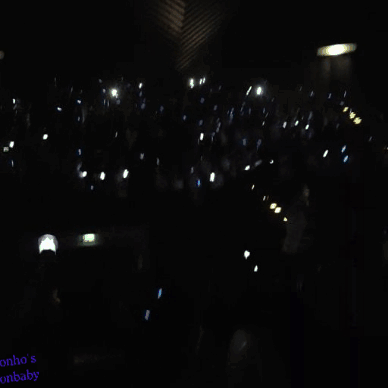
The concert continued with well-awaited performances such as ‘From Zero’, performed by vocalist Wonho as his partner, Hyungwon, was missing, ‘24K Magic’ performed by vocalists Minhyuk and Shownu and rapper I.M, and the highly emotional ‘Mirror’, a remake of ‘Lil Wayne’s song performed by members Jooheon and Kihyun. Of course, the crowd was energetic as usual, screaming at the top of their lungs and singing along to every song.

As the concert came to a close, the group gave their final farewells, thanking fans for coming and supporting and wishing everyone a safe trip back home. The night ended in fan-chants, cheers, and screaming as people exited the venue and headed back to their homes and their daily lives.
Some clips from the concert: (x)(x)(x)
1 note
·
View note
Text
Album Review: BTS’s “Love Yourself 承 ‘Her’”

Boy group BTS, a well-known seven member K-Pop group under BigHit Entertainment, recently released their newest tracks to the public. BTS’s recent mini-album, “Love Yourself 承 ‘Her’”, was released on September 18th, 2017, and has been gaining pages upon pages of media attention ever since, catching the eye of popular sources such as Billboard and The New York Times. The mini-album has also gained over 38 million views on YouTube for one of it’s tracks, ‘DNA’, sold over 600 thousand copies of it’s physical album in South Korea alone, and has become #1 in 78 countries worldwide, breaking the record for #1 in the most countries by a K-pop group, formerly held by the famous boy-group Big Bang.
The album has range of sounds, from the soft, slow R&B sound of the Intro, ‘Serendipity’, to the swagger-filled Hip-Hop beat of the seventh track, ‘Mic Drop’. One of the two title tracks, ‘DNA’, is a fast-paced pop song about true love and destiny. Here, BTS is able to produce a sound that is full of life and power while also, at times, showing a playful side to their tone, sounding youthful. The song starts out with a whistling tune, then being picked up by the calm voice of member Taehyung, one of the four vocalists. The beat slows down from its quick pace to introduce the chorus, which truly pulls the listener in with it’s smooth rhythm and vocal power. ‘DNA’ ends with the soft, echoing tones of the vocal line (members Jin, Taehyung, Jungkook, and Jimin), and ultimately with rapper J-Hope’s playful tone.

The second title track of the mini-album, ‘Best of Me’, is a collaboration with popular American artists The Chainsmokers. The Chainsmokers are well-known for producing energetic and electric beats, seen in their songs ‘Closer’ and 'Selfie’, and ‘Best of Me’ showcases some of their most enticing musical production yet. This song, also about love and longing, starts slowly and soon builds to a pace closely comparable to that of ‘DNA’. The smooth rap of BTS’s leader, Rap Monster, immediately followed by the rap of fellow member Suga, allows the feeling of the song to truly be established. The vocals within the song have a light and airy feeling compared to the bass and rhythm of the instrumental in the background. The lyrics of the song paired with the vocal ability of BTS makes ‘Best of Me’ an outstanding musical track and a great listen.

The “Love Yourself 承 ‘Her’” mini-album has many more tracks, including ‘Pied Piper’, a slower track with a bit of a disco feel, ‘Go Go’, a down-paced song with a calm, island vibe to it, and even a recording of the moment that BTS won the Top Social Artist award at the 2017 Billboard Music Award Ceremony, named ‘Skit: Billboard Music Awards Speech’. The music from this mini-album release has captivated audiences from all around the globe and has proven to be a success, even just three days after it’s release.
Take a listen: Love Yourself 承 ‘Her’ (Spotify) (iTunes) (YouTube)
Live Performances: ‘MIC Drop’ (x), ‘DNA’ (x), ‘Go Go’ (x)
4 notes
·
View notes
Text
Song Highlight: BTS’s “Spring Day (봄날)”
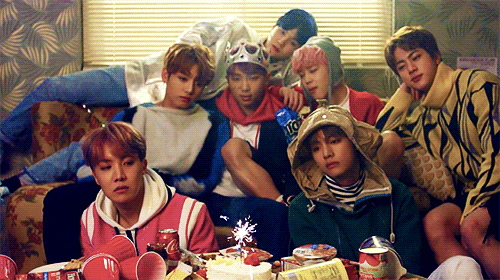
Firstly, boy group BTS, also known as ‘Bulletproof Boy Scouts’ or ‘Bangtan’, is a seven member K-Pop group under BigHit Entertainment, popular not only in Korea but also around the globe. They have received countless mentions, awards, and media attention in Korea, and recently even took home the Top Social Artist award at the 2017 Billboard Music Awards in Las Vegas, becoming the first K-Pop group to do so. BTS is recognized worldwide for their socially conscious lyrics in songs such as “No More Dream”, “Silver Spoon (뱁새)”, “Reflection”, and recently, “Spring Day”.
The track “Spring Day” from BTS’s latest repackaged album, “You Never Walk Alone”, is a song about missing someone, a close friend, and how this longing feeling can feel as if the cold of winter is never-ending. The song is slightly upbeat with a calm pop feel, and the voices of the BTS members are smooth, fitting nicely into the relaxed vibe of the track.
The lyrics, though, are what truly make this song stand out within the crowd. Besides them singing and rapping about a distant friendship, BTS’s lyrics and music video also seem to highlight serious issues such as depression and suicide:
“It’s only winter here. Even in August, winter is here. ... I wanna hold your hand And go to the other side of the earth To end this winter. How much longing has to fall like snow For the spring days to come? Friend.”
In literature, the winter season can signify sadness, depression, and dark times, such as would come about from losing a close friend to suicide. Also, in the “Spring Day” music video, one of the BTS members, Jimin, is seen picking up sneakers off the beach, and by the end of the video he hangs them on a tree branch in a snowy field (here). In Korea, finding sneakers or other shoes by the ocean is a significant of death, specifically suicide, and tying shoes to trees or electricity wires is seen as a way to commemorate a lost friend all over the world.

It is quite notable that BTS highlighted such issues in their music because South Korea is a country with one of the highest teen suicide rates in the world, yet a society that does not hold many conversations about the issues as they may be seen as taboo. This, of course, does not do much of anything to help combat the high suicide rates, as stress from school and life still push youth to turn for the worst. BTS showcasing these issues in their songs not only allows people to talk about the issues more, but it allows them to realize that they are not alone in their struggles and that they can seek help. By the end of “Spring Day”, the lyrics become happier and hopeful, saying:
“Cherry blossoms are blooming, The winter is ending. I miss you. If I wait a little longer, If I stay up a few more nights, I’ll go see you. I’ll go pick you up.”
Winter is finally ending and the Spring season is tangible once again. There is always a light at the end of the tunnel, and BTS shows this with their music time and time again. Sending hope to someone through lyrics can make a huge difference, a life-changing difference, and sometimes all people have is music.

So, please do support BTS, and watch a few of their videos: (here), (here), (here), and (here).
#song highlight#song recommendation#kpop#BTS#bangtan#spring day#bts v#bts jimin#bts jungkook#bts namjoon#bts jhope#bts jin#bts suga#bts seokjin#bts yoongi#bts rap monster#bts scenarios#bts taehyung#taehyung#jimin#jungkook#namjoon#yoongi#hoseok#jin#seokjin#kim seokjin#kim namjoon#min yoongi#jung hoseok
14 notes
·
View notes
Text
“Gashina” by Sunmi; Breaking Down Gender Roles in South Korea
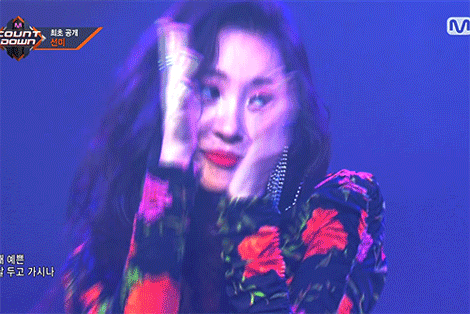
Sunmi is known for her beautiful and groundbreaking solo work as a K-pop artist in South Korea. Her previous singles (24 hours, Full Moon) show powerful female roles and capture the sexiness, prowess, and determination of women in different settings and situations. Recently, Sunmi released her newest single “Gashina” that caught the eye of many people worldwide.
Gashina has an EDM/trop house vibe while still managing to highlight Sunmi’s vocals as the main point of focus. The lyrics and the music video itself portray the feelings of being dumped, but also realizing how much value that you, as a strong woman, have despite being left by a partner. It’s very empowering and gives both younger and older generations a kind of free spirited and confident aura in the face of difficult times, and or feelings of inferiority.
The strength that she shows both in the MV and lyrics of Gashina is incredible. The lyrics are …
“You have withered, I have bloomed And it’s over Even if you wanna come back You may seem like you’ll be fine without me right now But no matter how much I think about it Are you sure you’re not crazy?
Why are you leaving the pretty me here”
This is the part of the last verse and chorus. Throughout the song she states that she will live on, albeit sad about being left behind. But as the beat goes on, as she continues to sing about her feelings and her troubles, she gains more confidence, and settles on the fact that she is more complete and beautiful without toxic relationships in her life. Paired with the powerful imagery below, it shows viewers that its okay to love yourself, even if someone else does not.

Not only does Sunmi break gender roles by showcasing strong feminine morale and undying confidence, but also through her choreography and dance practice videos. She has two dance practice videos, one original video where men portray her partners in the choreography, and a role reversal video where women portray her partners. This is revolutionary because it highlights the fact that women can perform, act, and dance at the same levels that men can, while simultaneously shedding light to the fact that LGBT relationship are just like any other relationships.
Now, many people don’t actually watch the dance practices, or feel the need to support them. However, people do tune into stage and or live performances. So, for one of her live stages, on a very popular South Korean program called Inkigayo, she performed the reverse dance practice in front of millions of viewers. Therefore, the general public saw the power of women and the fluidity of sexuality live, whether they wanted to or not. This is so important because in order for people in South Korea to accept new roles for women or to accept different kinds of sexualities, they need to be exposed to it. And that is exactly what Sunmi did with this performance.

In the end, Gashina
1). Empowers women, and makes them see that they are not only better than the people who left them behind, but that they can love themselves without any body else giving them love in return.
2). Normalizes the fluidity of sexuality in relationships.
3). Showcases the talents of both men and women in the performance industry.
Give Sunmi lots of love and support and check out some of Gashina’s live performances here and here :)!!
18 notes
·
View notes
Text
Lana or Lolita

One of my favorite albums to listen to on a long car ride is Lana Del Rey’s Born to Die. The entire album brings me a mix of emotions of nostalgia and sadness. One of the songs that I like to play on repeat is Off to the Races.
My first impression of the song was that she was singing about some chaotic and unhealthy relationship she had with an older man. On the surface we can hear that she is singing about a lustful relationship and what seems like an obsession with one another. Throughout the song she uses places to describe her personality and we all somehow understand what she means when she describes her past as Las Vegas and having an LA crass way about her. One author described this psychogeography.
Further into the song the seemingly innocent relationship escalates and she says that she would die without him and..”I need you, I breathe you, I never leave you. They would rue the day I was alone without you” It makes me think about younger girls who misinterpret what love is and are manipulated into thinking this way by older men. I like the honesty that she has when describing herself and this man and how raw she makes the relationship out to be. She does not hold back to describe things like how he likes “every inch of my tar-black soul.” It is different than the usual fairy tale relationship that we hear in other songs.
After listening to more of Lana Del Rey’s songs it can be speculated that she is in fact writing about one of her own somewhat chaotic relationships. You can hear this chaos in the way she sings throughout the song. She starts singing like she is talking and it sounds almost lazy. She speeds up and sings very high pitched and then goes back to her singing where she sounds like she’s just chatting with someone. The ups and downs of her voice mixed with the drumming and progressively intensified beats make me feel the chaotic emotions that she sings throughout the song. When I listened solely to the music in the background it reminded me of a hip-hop song.
After further research I found that one of lines is the opening lines of the book Lolita. She sings “ Light of my life, fire in my loins.” When I listened to the lyrics again after finding that out, I could hear that the way she sings about him has a similar sense of the relationship between, an underage girl, in love with an older man.
It is possible that Lana was writing about a modern day Lolita because of the lyrics that she uses like,
Because I’m crazy, baby I need you to come here and save me I’m your little scarlet starlet Singing in the garden Kiss me on my open mouth
During this part of the song, 2:19 in the video, she sings in a voice where she sounds like a child rather than the “small talk” voice she was using in the beginning.
Overall, the song feels like an unhealthy obsession, a vice, that she does not want to let go of. The hip-hop beat made the song feel like a dilemma she did not know was bad and the way the song ends with string instruments playing alone for 30 seconds in the end fades to feel like it would continue to be this way.
Source of gif
38 notes
·
View notes